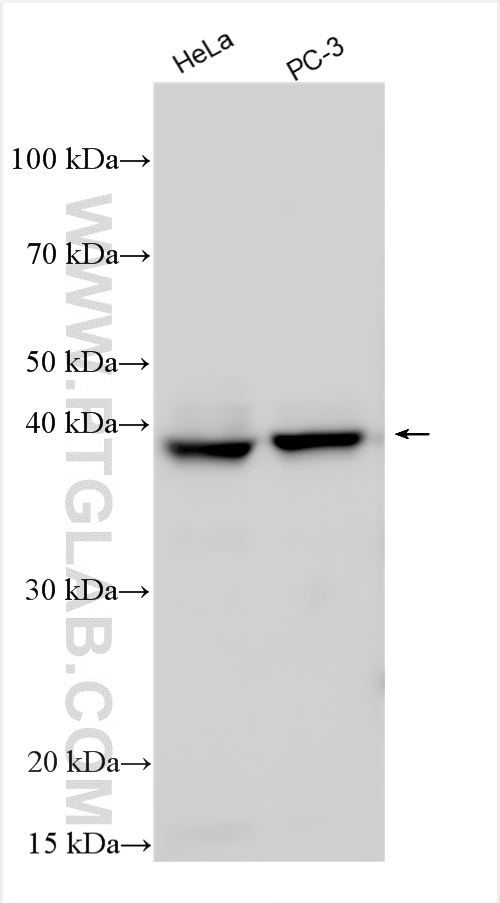SPOPL Polyclonal antibody
SPOPL Polyclonal Antibody for WB, ELISA
Host / Isotype
Rabbit / IgG
Reactivity
human, mouse, rat
Applications
WB, ELISA
Conjugate
Unconjugated
验证数据展示
经过测试的应用
| Positive WB detected in | HeLa cells, PC-3 cells |
推荐稀释比
| Application | Dilution |
|---|---|
| Western Blot (WB) | WB : 1:500-1:2000 |
| It is recommended that this reagent should be titrated in each testing system to obtain optimal results. | |
| Sample-dependent, Check data in validation data gallery. | |
产品信息
17740-1-AP targets SPOPL in WB, ELISA applications and shows reactivity with human, mouse, rat samples.
| Tested Applications | WB, ELISA Application Description |
| Tested Reactivity | human, mouse, rat |
| Immunogen | SPOPL fusion protein Ag11951 种属同源性预测 |
| Host / Isotype | Rabbit / IgG |
| Class | Polyclonal |
| Type | Antibody |
| Full Name | speckle-type POZ protein-like |
| Synonyms | HIB homolog 2, Roadkill homolog 2, speckle type POZ protein like, SPOPL |
| Calculated Molecular Weight | 392 aa, 45 kDa |
| Observed Molecular Weight | 39-45 kDa |
| GenBank Accession Number | BC071613 |
| Gene Symbol | SPOPL |
| Gene ID (NCBI) | 339745 |
| RRID | AB_3085537 |
| Conjugate | Unconjugated |
| Form | Liquid |
| Purification Method | Antigen affinity purification |
| UNIPROT ID | Q6IQ16 |
| Storage Buffer | PBS with 0.02% sodium azide and 50% glycerol pH 7.3. |
| Storage Conditions | Store at -20°C. Stable for one year after shipment. Aliquoting is unnecessary for -20oC storage. |
背景介绍
Speckle Type POZ Protein Like (SPOPL), a member of the MATH-BTB protein family, was frst identifed in 2010 with 82.6% sequence homology with Speckle-type POZ protein (SPOP). SPOPL is an E3 ubiquitin ligase protein that ubiquitinates and degrades the target protein. SPOPL can be used as a potential prognostic biomarker for glioblastoma multiforme in clinical work and promotes the proliferation and stemness of glioma stem cells by activating the Notch signaling pathway (PMID:37523046).
实验方案
| Product Specific Protocols | |
|---|---|
| WB protocol for SPOPL antibody 17740-1-AP | Download protocol |
| Standard Protocols | |
|---|---|
| Click here to view our Standard Protocols |
